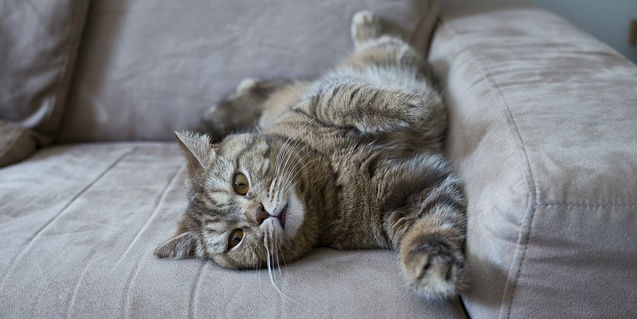What are some ways of how to stop how to stop a cat from spraying indoors and inappropriate urination?
Original Question: 1) Zuzu keeps going on my towels and clothes and inside of some boxes trying to pee. This didn't happen before. I tried cleaning his litter box but he still won't go. Please help. I'm really worried about him and my family can't afford to go to the vet. 2) I've had my cat for 1 ½ years and 3-4 weeks ago my cat started peeing on a couch in the den adjacent to the laundry room where his litter box is. He would also pee in his litter box too. I took him to his vet and they suspected a UTI and he went on two rounds of antibiotics (1. Convenia injection, 2. 15ml Clavamox bottle). He is peeing more in his box and every few days on the couch. During the second dose of antibiotics he was consistently peeing in the litter box and then to our surprise peed twice again on the sofa in the den which is covered with sheets now. We’re unsure if it's medical or psychological as per my vet. My vet suggests another round of oral antibiotics and if that doesn't work progesterone injections. Note: the couch in the den has been there since we got him and we had no issue. We haven't changed his diet, no major change in the house or environment. Appreciate your thoughts! Thank you. - Anonymous
 Feb 3, 2019
Feb 3, 2019
Hi there,
So the first thing that we need to discuss is, is the cat spraying or is there inappropriate urination going on? So spraying is a marking behavior that is typically against vertical surfaces. What they do is back up against maybe with the side of a couch, against the bed or wall where they lift their tail and spray out on that vertical surface. On the other hand, inappropriate urination typically involves squatting to pee like normal so assuming a normal urination position and then peeing on a horizontal surface that is not the litter box.
We also need to rule out any underlying health problems, and this is especially the case with inappropriate urination. Now cystitis is probably the most common and in the vast majority of cats this is not due to an infection. So very often we’ll only give antibiotics when there is a positive urine culture result. So it definitely used to be that we’d give our cats a lot more antibiotics when they had a suspected UTI but really we understand now that it’s generally a stress response and that’s the number one cause of cystitis-like symptoms unlike dogs who are much more likely to get a bacterial infection causing cystitis. So it’s normally stress related and we typically treat that with anti-inflammatories. There are a few other things that can be done; we can try to increase the water intake and modify the diet as well. There are also a number of steps we can take to reduce stress with stress being the number one cause of feline idiopathic cystitis and that could be ensuring there are enough resources so food bowls, water bowls, and litter trays. There should be one more than the number of cats in the house so if you’ve got three cats that should be four separate food bowls, four water bowls and four clean litter trays at all times. We can use a microchip cat flap to stop strange cats coming into the house, we can use a feline pheromone product and we can give our cats a safe space where they can retreat if they’re feeling uncomfortable or threatened.
Other underlying health problems that can also cause inappropriate urination can be arthritis. If a cat is actually finding it difficult to get into the litter tray, especially if it’s got a high lip, then arthritis can be a cause. Kidney disease and diabetes can also be causes because they are just going to cause a cat to produce more urine and so they’re going to go need to go more often and may not able to reach the litter tray when they need to go. Bladder stones can also cause this problem.
If you’ve got an entire cat, then neutering your cat is going to help reduce inappropriate urination, especially if we’re talking about spraying here. Reducing stress as I have already discussed is so important because they hide it so well. Try and evaluate for anything that could be causing your cat stress and reduce those if at all possible.
Litter box cleaning is also important. Cats can be very fussy when another cat has been in a litter tray and even if it’s only small amounts of urine they won’t use it. We need to look at litter box numbers like I say, so one more than every cat. Some cats are really fussy when it comes to litter type, so they might not like a scented litter, they might not like a clay based litter because it clumps up underneath their feet and also location could be a problem. The litter tray should never be placed in a very busy thoroughfare. They should always be placed in private spots so that a cat can do its business without being observed, which is something that is important to them.
Finally, we also need to clean up their inappropriate urination properly so we can do that in a number of ways. There are enzyme sprays that you can buy that will break down the urine and get rid of that problem. What you can also do is you can take a biological washing powder, mix that with a little bit of water to make a solution, and then let that soak in really well to the area where they’ve peed, where it will break down that urine and get rid of the problem. What we absolutely must do is avoid ammonia-based products because they will actually attract a cat back to that area and really accentuate and perpetuate the habit rather than curing and eliminating it.
I hope this helps.
Dr. Alex Avery


Disclaimer: healthcareforpets.com and its team of veterinarians and clinicians do not endorse any products, services, or recommended advice. All advice presented by our veterinarians, clinicians, tools, resources, etc is not meant to replace a regular physical exam and consultation with your primary veterinarian or other clinicians. We always encourage you to seek medical advice from your regular veterinarian.

